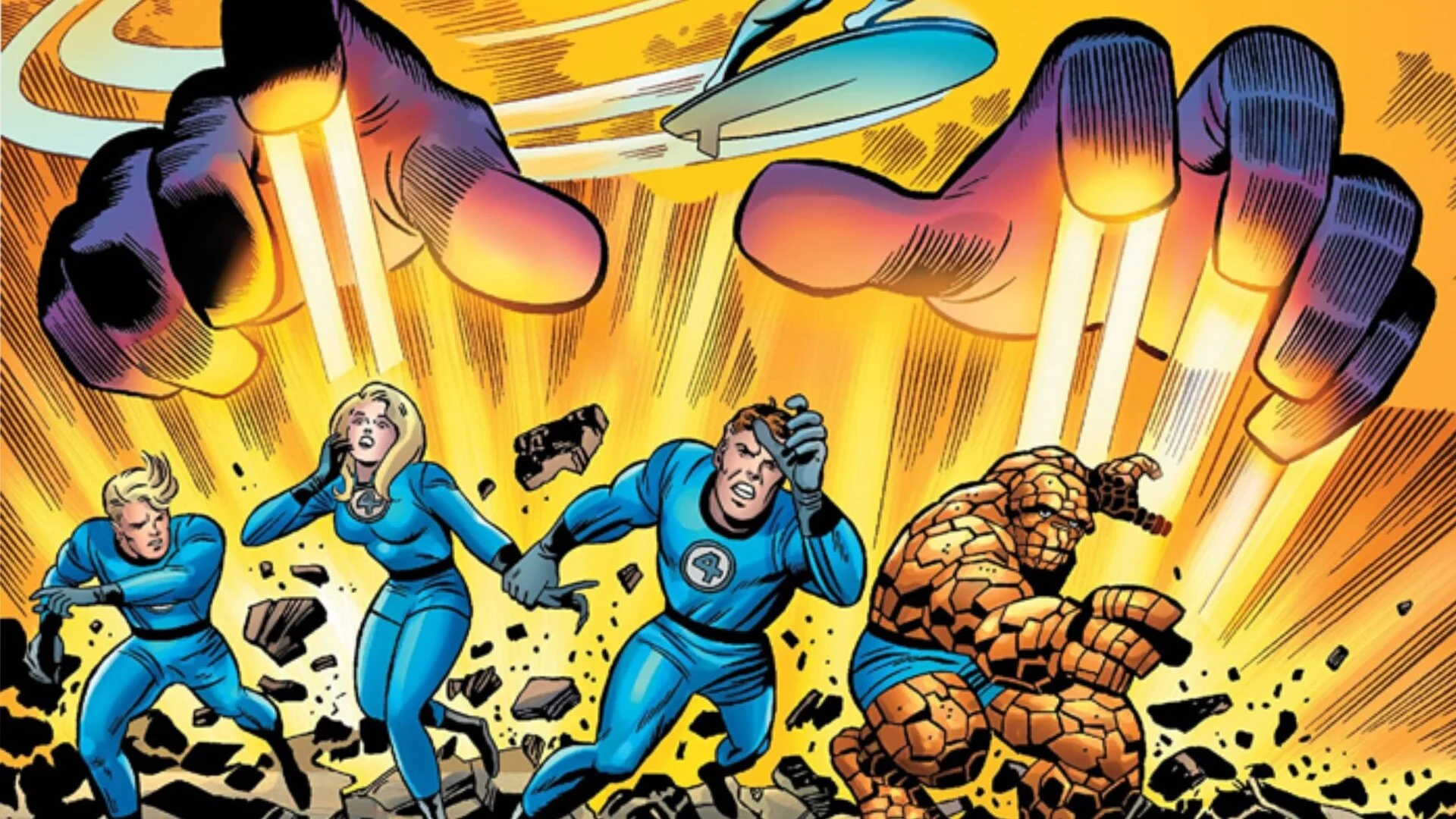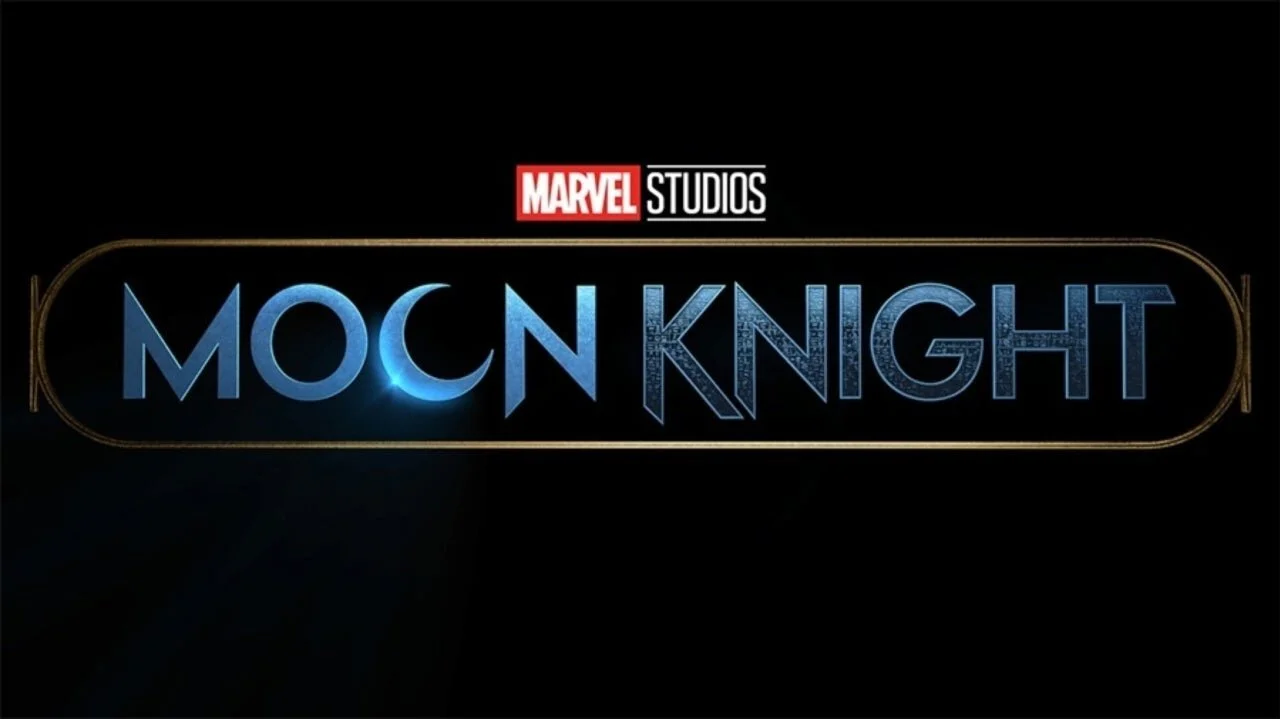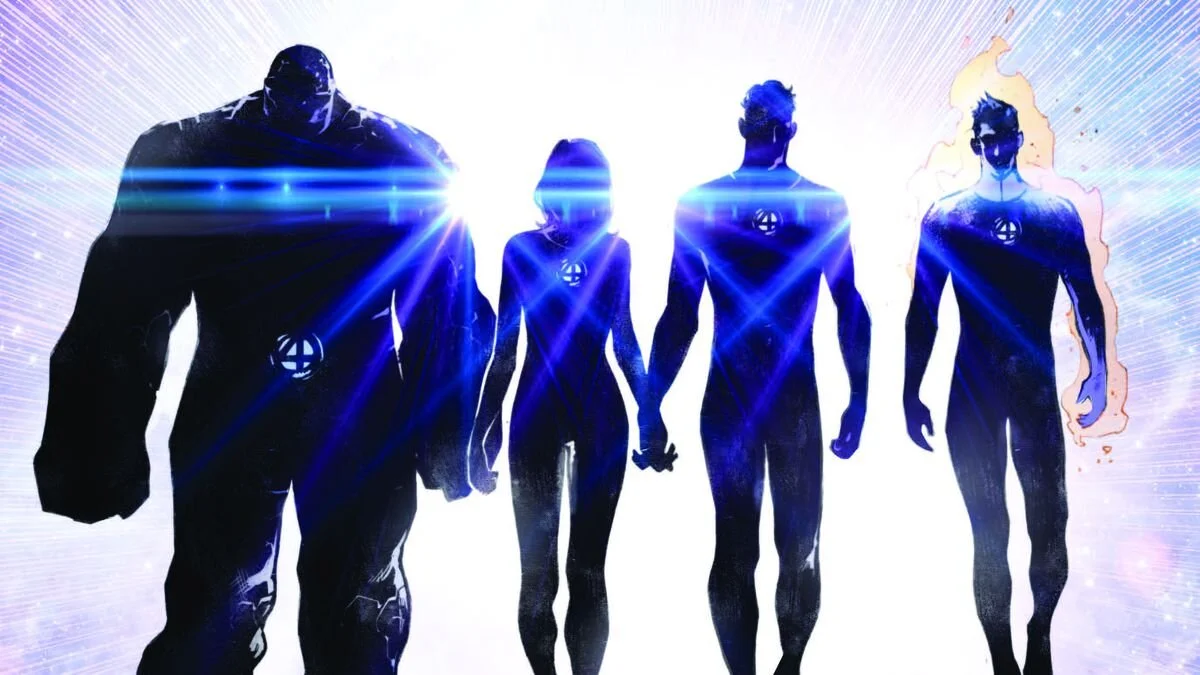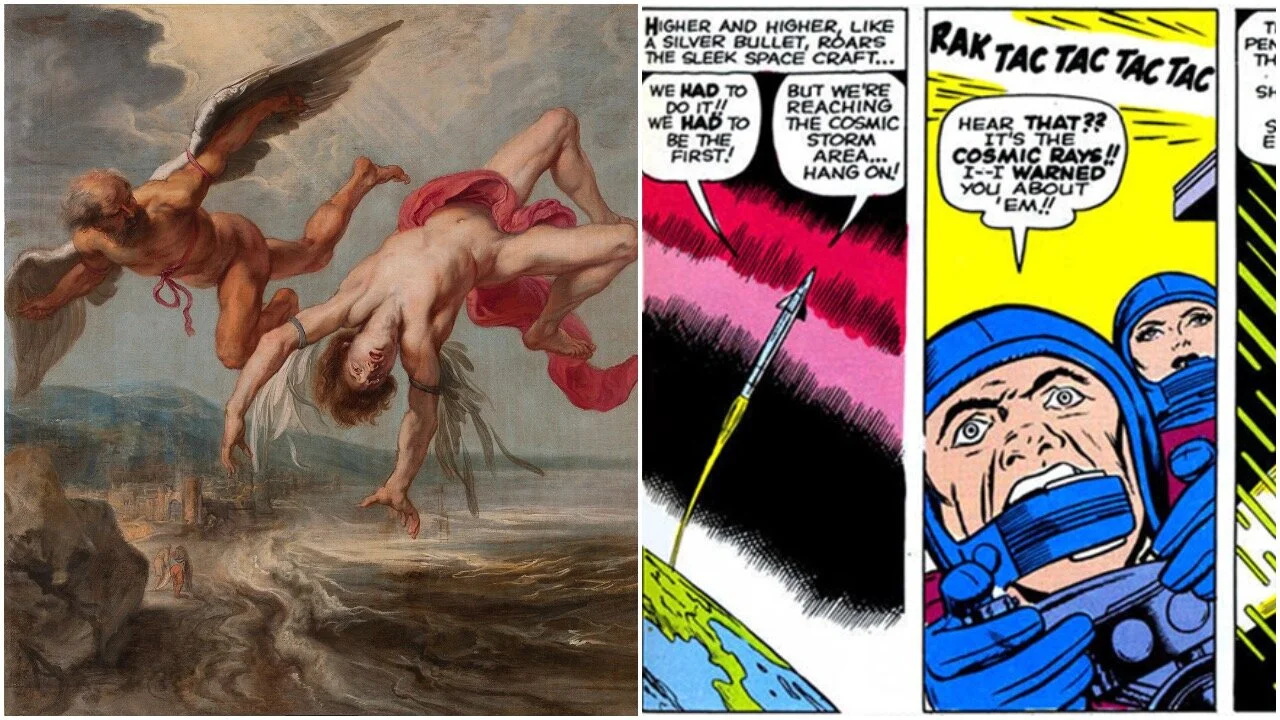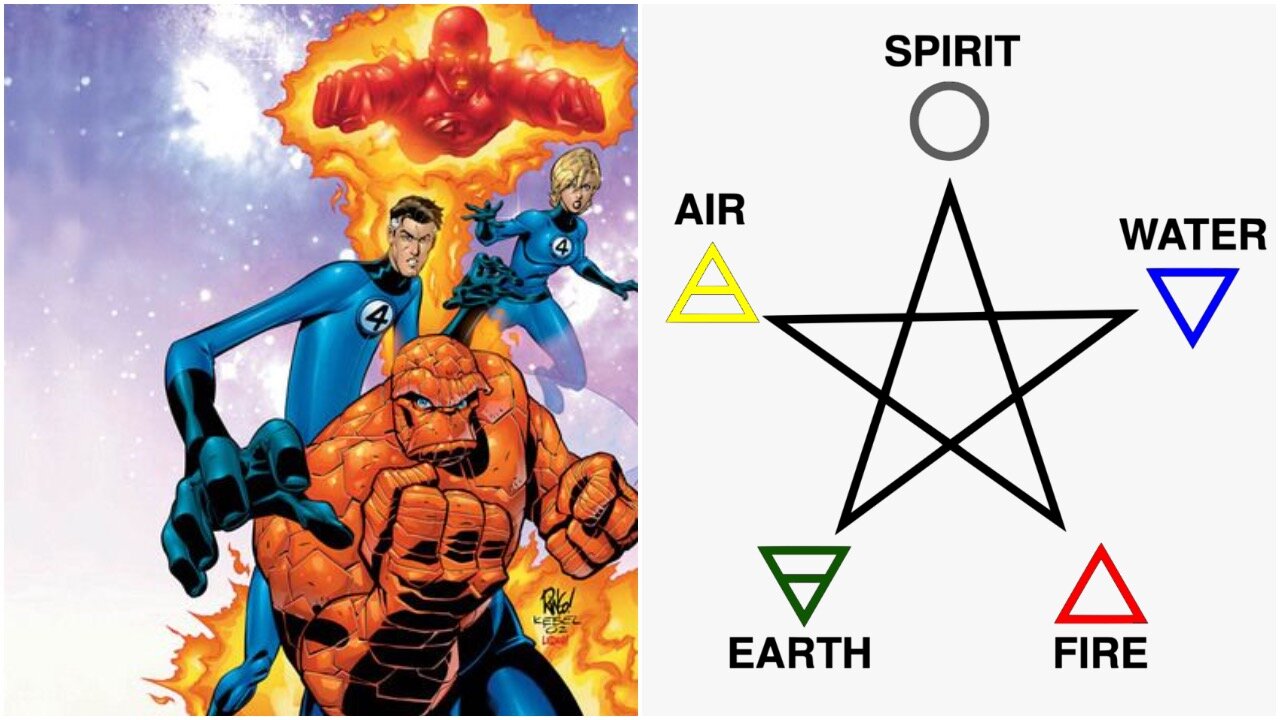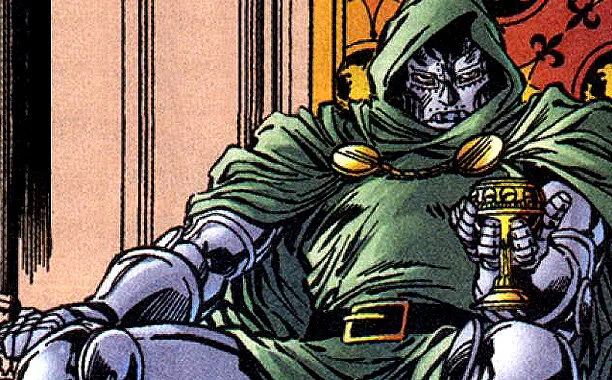The Fantastic Four: Icarus Wins
Being a fan of superheroes isn't too dissimilar to owning a Russian nesting doll. You get access to several facets of media for the price of one. The foremost exterior of the doll is the world of film, and beneath that lies the shell of television. Keep on prying, and you'll eventually work your way towards the diminutive doll known as comic books. Suffice to say, comics are niche, but there are nooks in the niche where even the most cosmopolitan fans scarcely traipse. More often than not, those are the dives that garner my attendance.
I'm talking about barely barren watering holes with Savage Dragon polishing glasses at the bar; the Legion of Superheroes corralling around a sputtering jukebox while Ka-Zar and Shanna hold court near the pool table. Littering the walls are pictures of our former barfly brethren, who've since made it big. Guys like Daredevil and Green Arrow have their old costumes retired. Moon Knight keeps yapping about how his big break is on the way...
...to which we respond with a hearty laugh, grabbing him another Blue Moon.
Recently, we've welcomed some new faces in the joint. Fallen big shots that used to command respect from every pajama-wearing peon they passed. Now, sullen and dejected, they huddle in the corner, feeling foreign to this level of obscurity. "How many you having?" I shout. A weighty pause precedes a faint, "Four. We're having four."
Let's not mince words; I love the Fantastic Four. In the age of ironic adoration, that claim could ring disingenuous, but it's the gospel, my friends. Yet, the quartet seems to rouse nothing but apathy among the populace for some reason. Anytime the perception pendulum swings towards uncool with superheroes, I refuse to denounce the idea. Instead, I just chalk it up to the central metaphor becoming obscured over time.
Like every myth before them, the characters in superhero comics express subconscious manifestations of our thoughts about the world. Through the craft of storytelling, humans launch idea probes- powered by myth- to pierce the border of our understanding with narrative in hopes of offering hazy explanations related to ineffable aspects of life. The further a myth drifts from its central metaphor, the less applicable it becomes. I believe that this concept causes superheroes to lose potency and popularity rapidly.
Take a character like the Hulk, birthed by a scientific weapon of his own creation. Produced in 1960's America - the decade following intense nuclear paranoia- the Hulk speaks to technological sophistication creating a new form of savagery. Since the central metaphor of the Hulk is as salient as ever, the character's popularity is equally unimpeached.
Is it any coincidence that critical moments of the ever-evolving feminist movement(such as the 70s and the #Metoo era of modernity) always align with Wonder Woman reaching unprecedented levels of mainstream popularity?
So, in short, the Fantastic Four has lost touch with its central metaphor. Begging the obvious question, "what the hell is the Fantastic Four about?"
Steeped in the 60’s Marvel tradition of science-based heroes, the FF gained their powers from a failed trip to the moon- predating the Apollo 11 landing by eight years. Most detractors cite their origin as dated, but that critique rings false with the prominence of privatized space travel among the uber-wealthy. We’re as fascinated about space as we’ve ever been. So what changed? Is it the eroding idea of the nuclear family? One look at the popularity of the Incredibles- modeled directly after the Fantastic Four- should swat that misapprehension away. The Fantastic Four isn’t just a nuclear family; they represent all of humanity.
In the story of Icarus, a young man with wax wings sails towards the heavens until the sun rays melt his means of ascension. Daedalus- the boy’s father and inventor of the wings- is stricken with intense guilt and grieves for his late son. Clearly, the metaphor of the story relates to the arrogance of man striving to climb towards divinity. We see this narrative repeated in the biblical tower of babel as well. The Fantastic Four- and their space fairing origin- is a contemporary update on this story with a life-affirming and humanist twist.
Witnessing a wealth of scientific progress unfold before them, Americans of the 1960s were promised “better living through chemistry” and a dream of mechanical convenience. With the almost apocalyptic destruction of the a-bomb and the advent of commercial air travel, humans began to reevaluate their relationship to nature and religion. Echoing this sentiment in their attempted lunar trip, the Fantastic Four- specifically Reed Richards- are made to symbolize man’s expanding ego. Believing failure to be impossible, despite the logical protestations of Ben Grimm, Reed coaxes his cohorts into the modern equivalent of Icarus’ wings: a test rocket. Like the copious myths before them, the quartet plummets to Earth.
This is where the story deviates from form to become decidedly humanist. Instead of crumbling in the face of God, the Fantastic Four come back to Earth enhanced by divinity.
Reflecting on the 60's view of technology being transformative and destructive, the Fantastic Four are both humbled and rewarded for their attempts to broaden human understanding. The only member of the FF that's physically punished by the trip is Ben Grimm. By hoping to ground the FF with his albeit rational concerns, Ben Grimm literally turns to rock. His attempts to stifle the quartet's upward trajectory- casting him as a science heretic- turns him into a monster.
The nature of the group's elemental powers helps bolster this view as well. Earth, wind, fire, water, and ether are the five aspects of alchemy- the mysterious "science" of transformation- and correspond to Ben, Sue, Johnny, and Reed. Reed's correlation to water may throw most people off- due to his powers of stretch- but the association isn't literal. Reed's mind, demeanor, and spiritual clarity - before John Byrne's take on the character- represent the flow state of water. Viewed in conjunction with the fluid nature of his body, the metaphor begins to take shape.
Astute readers may be wondering where ether comes into the picture. Scratch that; most readers are probably wondering what ether even is. Ether is the mystical element of the alchemy world. You could see it as magic or spirit. Given that the group is called the Fantastic Four, as opposed to five, clearly, there isn't a fifth magical group member, right? Enter: Doctor Doom.
During his stint in college, Victor Von Doom undertakes an experiment to breach the underworld and rescue his mother's soul. Using scientific means to do so, Doom mirrors the comic's theme of technology bridging the gaps of human understanding and the unknown. In an inversion of Mr. Fantastic and Ben's discussion about venturing into space, Reed corrects Doom's blueprints for the impending experiment. Crippled by his arrogance, Doom reverses the corrections and is disfigured by the resulting failure of his experiment. Unlike Reed-who is rewarded for ascending to the stars, resisting the heretics' critiques- Victor is punished for descending towards the underworld while rejecting the council of a fellow scientist.
Instead of accepting humility, Doom sinks deeper into mystical knowledge, isolating himself from other scientists. Unlike Icarus, the Fantastic Four isn't about the arrogance born from man's scientific achievements. The Fantastic Four celebrates man's scientific prowess and punishes those who reject it.
Doom isn't the only character to represent ether. There's a lengthy array of characters that fill the fifth element's slot. Uatu the watcher, Silver Surfer, Impossible Man, and even Franklin Richards are manifestations of the magical unknown that drive the book's narrative conflict. This leads us back to the central metaphor of the FF that's missing in modernity. When ether(the unknown) collides with the four elements(the observable reality), the FF's comprehension of the known universe trumps their opposition. Following their initial brush with the unknown, the group was blessed with powers- symbolic for a deeper understanding of themselves- capable of solving any lesser variant of the unknown.
The Fantastic Four is about how the knowledge of our frailty as a species- only revealed through a botched attempt to attain divinity- empowers us to combat the unknown. In this story, Icarus is victorious.
